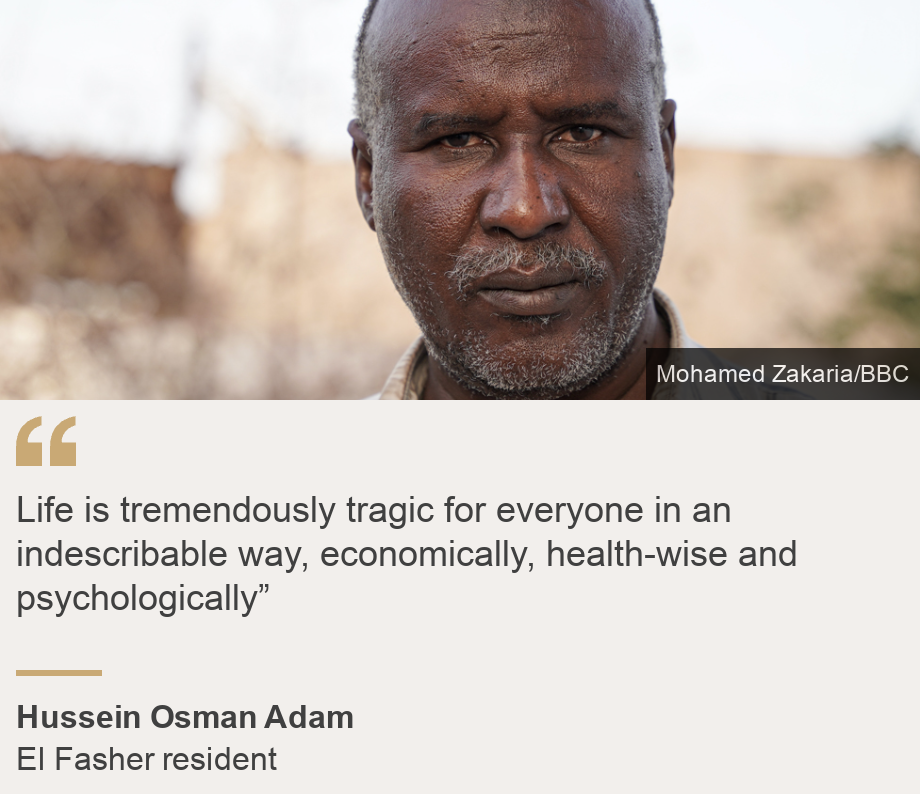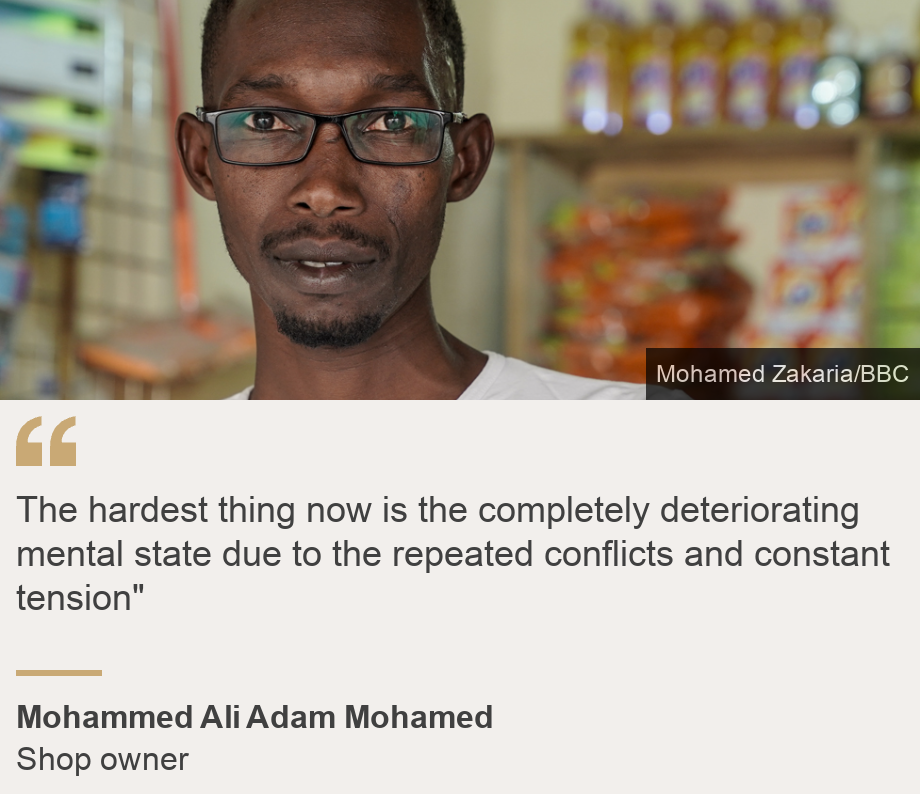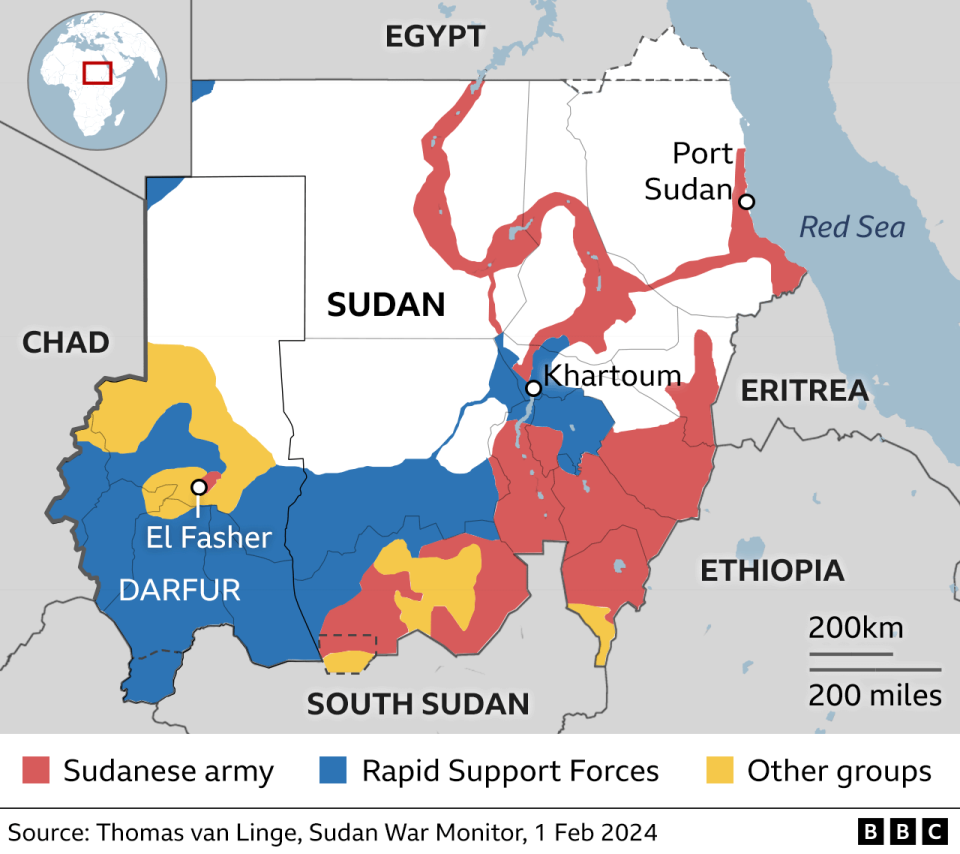In El Fasher, the main city in Sudan’s western Darfur region and the last major metropolitan center still under military control, the threat of invasion clouds the daily struggle for life.
“We are all living in absolute fear and constant anxiety about what the next few days hold,” says Osman Mohammed, a 31-year-old English teacher.
Mohamed Ali Adam Mohamed, 36, a grocery store owner with five children, has no doubts about what full-scale fighting would mean.
“If there is a clash between the Rapid Support Force (RSF) and the army in the city, we civilians will be the victims,” he told the BBC.
Sudan’s brutal civil war ended in just one year after two of the country’s most powerful military figures, one the head of the military and the other head of the RSF, who had staged a coup together, clashed over the country’s future. It started over a year ago.
Until now, El Fasher has been spared some of the worst violence and ethnic killings across Darfur, where the RSF is based.
But since mid-last month, militia groups have besieged El Fasher. El Fasher is a humanitarian hub hosting hundreds of thousands of displaced people, including those who have fled other areas occupied by the group.
According to the United Nations, 43 people have been killed in the shelling and skirmishes.
While people are waiting to see if the RSF will launch a full-scale attack on the city, their focus is on the fight for survival.
Osman is engaged and should be preparing for a new life with his fiancée, but instead he is preoccupied with meeting his basic needs.
“Life is very difficult because of the lack of security, the lack of cash flow, the lack of money in general,” he told the BBC. “Food, water, transportation, education, everything is very expensive.”
“The middle class has disappeared and 80% of the population is now poor,” Mohammed said.
He had to close his grocery store and open a smaller one after being hit by a stray bullet early in the conflict. But supplies are in short supply, and business is crippled by price fluctuations and monopolies.
“When roads are closed, prices go up significantly,” he says.

There is no electricity and water shortages are acute, exacerbated by fuel shortages and increased demand due to the influx of displaced people.
“The price of water is catastrophically high,” says Hussein Osman Adam, who works as a taxi driver and food dealer when he can.
“Life is indescribably tragic for everyone, financially, health-wise and psychologically.”
Mr. Hussain has diabetes, but there is a lack of supplies to test his blood sugar levels.
“At this point, we just don’t have any expectations,” he says.
The United Nations and the United States are expecting the worst.
They warned of the consequences of an all-out attack on a region already on the brink of starvation.
It would be a “genocide…disaster upon disaster,” U.S. Ambassador to the United Nations Linda Thomas-Greenfield said earlier this week.
This prediction is based on widespread looting, ethnic violence against non-Arab groups, and sexual attacks reported from other cities taken by RSF-allied Arab militias.
RSF commanders deny these accusations. They claim they have a legitimate right to self-defense against military aggression and accuse the military of intentionally killing civilians with barrel bombs.
One of the reasons they have not yet been able to capture El Fasher is that the local armed groups are allied with the Sudanese Armed Forces (SAF), and rebels, mainly from the Zaghawa tribe, have a decisive influence on the RSF. Because I have vowed to give you a terrible defeat.
Therefore, if war erupts in a besieged city, expect it to be intense and deadly.
“At this point there is no clear escape route for civilians and the SAF,” said Nathaniel Raymond, executive director of the Humanitarian Lab at the Yale School of Public Health.
“We call this phenomenon…the kill box,” he said at a recent emergency media briefing. “The scope for intervention is probably gone.”
Researchers are seeing evidence that the military is preparing to engage in close combat “to the death,” he said.
The international medical charity Médecins Sans Frontières (MSF), which is working in the area, told the BBC that it had treated 125 patients injured in the fighting, caused by military airstrikes and RSF artillery fire.
However, the Zamzam camp in southern El Fasher is home to many people who have been forced to flee their homes due to previous waves of ethnic violence, creating a malnutrition crisis that requires a significant strengthening of the humanitarian response. The group has been warning for months that this is the case.
Claire Nicolet, MSF’s head of emergency response in Sudan, says rising tensions have made the situation even more difficult than before, and that the situation will only get worse if the fighting intensifies.


Particularly in recent months, people forced to evacuate from surrounding areas have flooded into the city of El Fachel itself, living in areas known as schools and gathering areas.
Faiza Ibrahim Osman is the female director of one of these centers, Tambashi Center.
In a way, she is sharing their story of leaving their home in the north of the city. She says life has become concentrated in southern El Fasher because it is safer there.
The center is home to people with medical conditions that make it difficult to access medicine and treatment. But food shortages are the most pressing concern, with the Red Cross suspending the two-meal distribution per day.
On Thursday, a Koran reading was held at the center and “we prayed to Allah to stop the war,” she said.
“We fear rumors and hear gunshots in the distance,” she told the BBC. “We hear planes coming and anti-aircraft guns. We’re just afraid of a collision inside El Fasher.”
Claustrophobic fear is prevalent as all routes into and out of the city are closed and unsafe.
“The most difficult thing right now is that my mental state has completely deteriorated due to repeated conflicts and constant tension,” said Mohammed, a grocery store owner.
The United Nations fears people will be killed if they try to flee, but MSF says there is actually little place left for them to go.


More BBC articles about Sudan:


go to BBCAAfrica.com Check out more news from the African continent.
Follow me on Twitter @BBCA Africa,On facebook BBC Africa or on instagram bbcafrica











